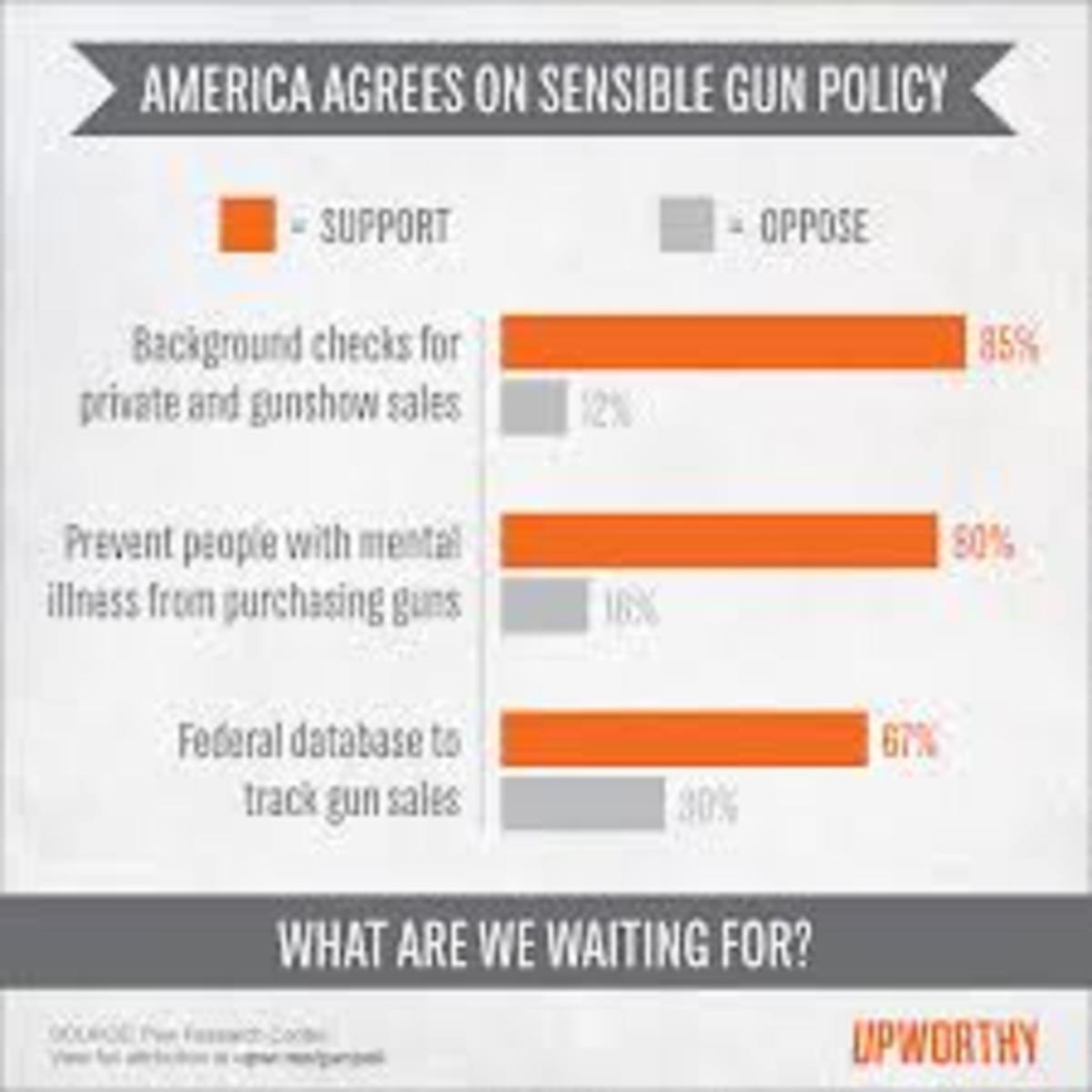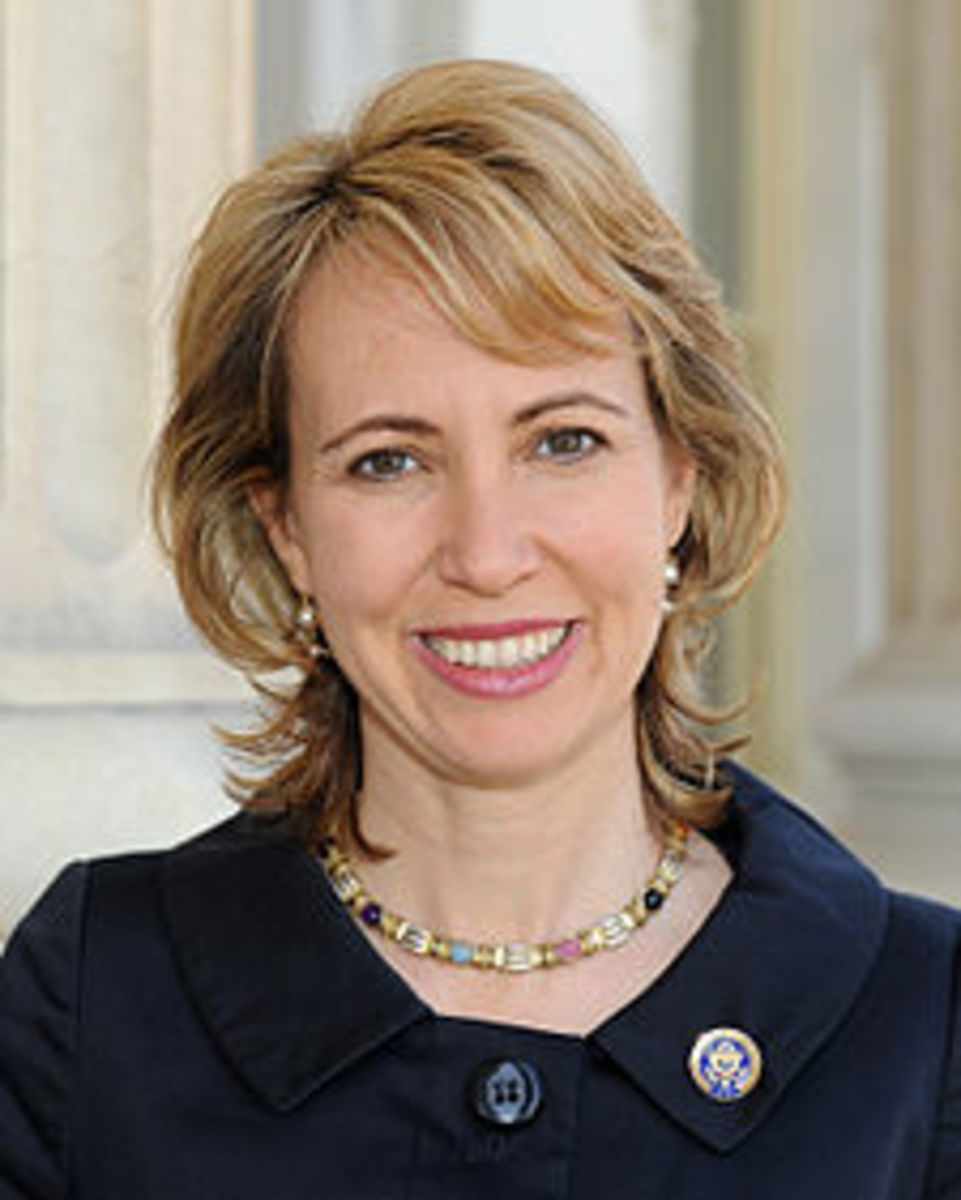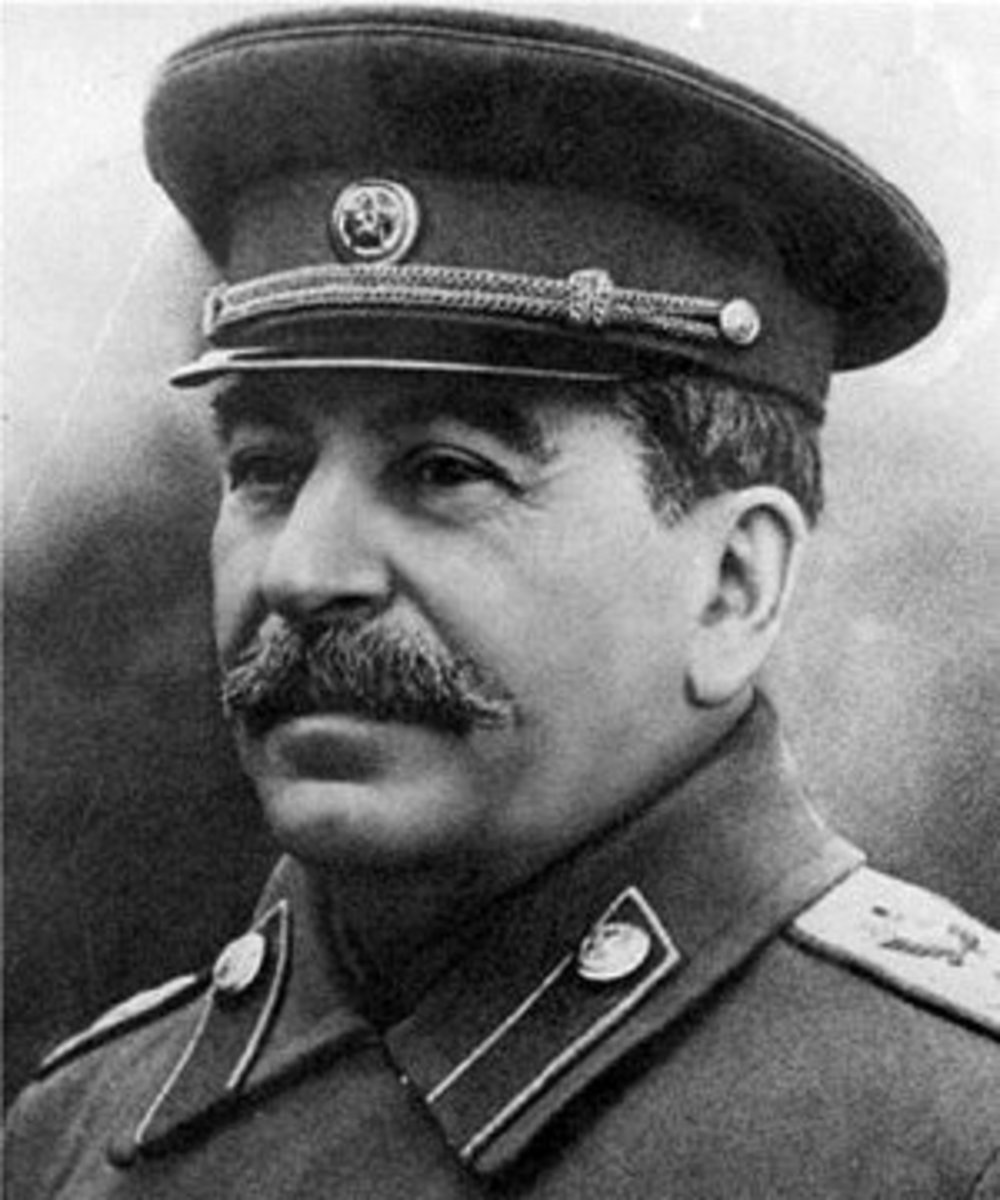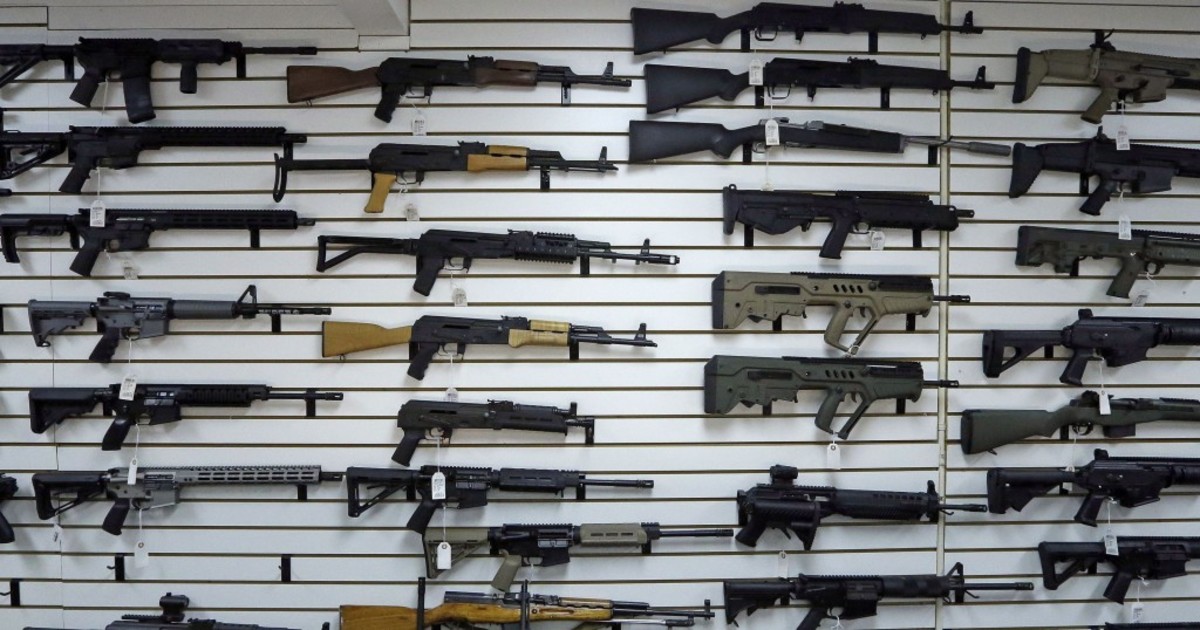Larry's Take on Gun Control and Violent Crime
How do you feel about draconian gun control laws in places like Chicago?

Introduction
In a comment at another hub, CJ Stone wrote:
"I think I am right in thinking that the murder rate in the US is much higher than in Europe, the problem being that with guns so freely available in your 'free' country, it's not only the sane who have access to them, but the insane too. This puts everyone on the defensive, making the sane people feel threatened, and therefore liable to act in an insane way."
CJ Stone's well-articulated position on civilian ownership of firearms is fairly representative of the perspectives of most British people.
As he points out, the specter of crazy people wielding guns in public is not an attractive one. However the prospect of disarming law-abiding citizens, who have a reasonable desire to feel secure in their own homes, is not wonderful either, especially when hard-core violent criminals still have access to Black Market firearms. Have the Brits shot themselves in the foot on this issue?
To use an Australian expression, let's be Fair Dinkum about the Gun Control question. Sorry, no graphs or charts.
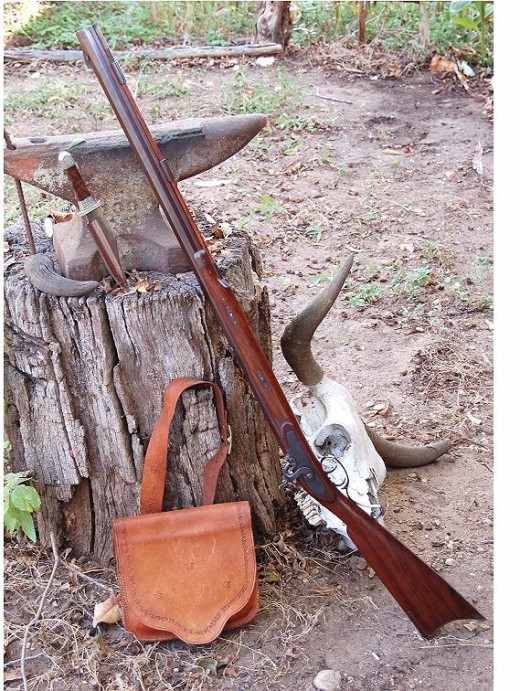
Extreme restrictions on all firearms?
Gun crime--not to mention knife crime--in Britain has increased appreciably since their government enacted firearms Prohibition for working class people. Cause and effect? I can't be 100% certain about that. However no reasonable person would classify the British experiment as an unqualified success. The prospects for a successful implementation of strict Gun Control in the USA are even less favorable, because of our porous Southern border, and because of our traditions, including the beleaguered 2nd Amendment of our Constitution. Here's an Einstein quote, which may or may not apply to strict Gun Control legislation in Britain, and to the draconian enforcement thereof:
"The definition of insanity is doing the same thing over and over again and expecting a different result."
We're not trying hard enough; we need to redouble our efforts. Yeah, right.
Here's an interesting contrast with Britain. Kennesaw, Georgia actively encourages responsible firearms ownership, and they are rated as a safer-than-average American community. But that fact, by itself, does not prove anything.
http://en.wikipedia.org/wiki/Kennesaw,_Georgia#Crime_statistics
The Beggar Thy Neighbour Effect is one possible explanation. Perhaps Kennesaw's reputation encourages criminals to move on to softer targets in nearby communities. It does not necessarily follow that if all American cities emulated Kennesaw, their crime rates would be as low as Kennesaw's. We should always be wary of the Fallacy of Composition.
Isolated statistical snapshots may not be the best way to divine the relationship between lawful firearms ownership and violent crime. Why? Because a correlation between Phenomenon A and Phenomenon B does not necessarily imply causation. Does A cause B, or does B cause A? Or do the two have a common cause?
There are many factors that influence published violent crime stats, including the ways that violent crimes are defined, as well as the proportion of unreported violent crimes. Both of these things vary from country to country. This makes direct international comparisons of violent crime rates problematic.
Although British people enjoy looking down their noses at 'gun-crazy' Americans, the violent crime rate is much higher in 'unarmed' England than in the 'gun-crazy' USA. This is based upon crime statistics published by both governments.
If we have a sufficiently large sample size, we can use statistical methods to tease out the effects of drastic changes in firearms laws on violent crime. But first, I'd like to mention two old sayings, starting with a quote from Mark Twain:
"There are three kinds of lies: lies, damned lies and statistics."
Yes, when we don't have experience dealing with statistical pitfalls, naked numbers can paint a misleading picture. Notwithstanding Mark Twain's extraordinary wit, I prefer another old saying:
Figures don't lie, but liars sure do figure.
For Gun Control advocates in the USA, the ' 'bible' on the subject, the Kellermann study, is touted as a conversation-stopper. However the Kellermann study was limited in scope; it emphasized body counts. Hence the legitimate conclusions that could be drawn from the study were more modest than the sweeping claims made by some of Kellerman's followers. Gary Kleck's study, which looked at the bigger picture, came to a different conclusion than the Kellerman study.
Firearms in the hands of responsible homeowners can deter home invasion robberies without necessarily killing anyone. Example: Sometimes shooting--and missing because of the extreme stress that you're under in the situation--can scare the bad guys away.
We already have a tentative static picture of the effects of firearm ownership on a variety of metrics that reflect self-defense and violent crime in the U.S. A slightly different picture may emerge if we had less restrictive firearms laws, because the gun owners' demographic would change. We need to do more statistical analysis.
Towards that end, we need to consider at least three types of scenarios. In Case C, a criminal deliberately uses a firearm in committing an armed robbery, or some other act of violence.
Case U (unintended) includes accidental shootings, as well as crimes of passion that are not premeditated. Citizen catches spouse in flagrante, runs to retrieve revolver from kitchen drawer, and shoots both offending parties, in a moment of temporary insanity. Or curious children discover unsecured firearms, thinking that they are toys, and a terrible tragedy ensues.
In Case D, armed citizen deters would-be home invasion robber (or would-be rapist). When a typical American homeowner brandishes a firearm, and scares off a home invasion robber, the homeowner is under no obligation to report that to the police. The number of criminals who seek hospital admission--or morgue admission--for gunshot wounds is considerably less than the total number of Case D's. This is why the Kleck study is so valuable.
Gathering stats on Case D's can involve a lot of work. You may need to do a carefully crafted telephone survey, with a large sample size, rather than simply trundling down to the nearest university library, and exhuming the less-relevant published stats.
Strict Gun Control decreases the number of Case D's, which translates into more Case C's, both of which are a bad results. But strict Gun Control would almost certainly decrease the number of Case U's, which is a good result. In moments of insanely jealous rage, some spouses would glom onto anything that could be used to inflict grievous bodily harm, if there were no firearms allowed in the home. But others would run out of steam before they found a sufficiently deadly weapon in the kitchen, or in the garage.
Putting the scenarios into perspective, Case U's are considerably less frequent than Case C crimes. And as our very own National Rifle Association points out,
"When guns are outlawed, only outlaws will have guns."
Surprise, surprise! Violent criminals do not give a rat's patootie about gun laws.
By the way, I'm not wild about the NRA's "cold dead fingers" slogan. For me, it applies more to chocolate than to firearms.
We should gather statistics on cities, counties, states, and countries that have made big changes in their firearms laws. And for a control group, we should look at the various government entities that have made no big changes in their firearms laws.
The control group is important because there's a long-term decrease in violent crime in the 'gun-crazy' USA. Preliminary evidence suggests that this is due to the phase-out of leaded gasoline, which decreased children's brains' exposure to the toxic metal.
We should compute average violent crime rates for the 5-year periods before and after each big change, for each of these political entities. Then compare these results with the corresponding figures for the control groups. Putting the shrill hysterics aside, there may be a real relationship between the gun control and violent crime. If we look closely, we may learn a thing or three.
Some firearms regulations for our de facto citizens' militia are reasonable, as well as being consistent with the 2nd Amendment. Who knows? Some of them may even put a small dent in violent crime.
Getting back to the dry stats, the Null Hypothesis is that stricter gun control laws have no effect on Case C. Can we reject the Null with 95% confidence?
Since I came up with the brilliant idea, I'll leave it to someone else to do the donkey work in gathering the actual numbers. For the statistical analysis we could use a simple Sign Test, or some other nonparametric method, which does not make dodgy assumptions about Gaussian Distributions.
Although I do have a dog in this fight, I am open to the possibility that my opinion on Gun Control is mistaken. I say: Let's gather the necessary data, and let's do an honest analysis. If that falls short of statistical significance, let's put the burden of evidence on the residents of Happy Valley Estates.
With a nod to Garrison Keillor, this is the perfect little world on the right side of the railroad tracks, where all of the women can speak French, the men do their share of the housework, and the children are never exposed to any discussions about effective self-defense methods against misunderstood violent criminals.

Handgun ban, anyone?
About dual use. It's reasonable for a hiker to carry a large-bore revolver for protection against Grizzly Bears in Alaska, and in parts of Idaho, Montana and Wyoming. Hunting with long guns is a popular pastime in the U.S. And sheep ranchers shoot coyotes in order to protect their flocks. In each of these three examples, the firearm could also be used for home defense.
Now suppose that we outlaw handgun ownership for all civilians.
What about that Alaskan hiker? We wouldn't want him to be eaten by a Griz, would we? Although it would be considerably less convenient than packing a revolver, he could start carrying a long gun for bear protection. But would the local game warden interpret that as hunting without a license?
A duck hunter's 12-gauge pump-action shotgun definitely qualifies as a dual-use weapon. But a .30-30 deer rifle is a mixed bag. In one respect, it's an attractive alternative to a 12-gauge, because the recoil is less. And yes, you could definitely protect your family with it, but here's the rub. Suppose that while the adrenalin is pumping, you shoot at an armed home invasion robber, and miss. That bullet is more likely to over-penetrate drywall and stucco, and to injure or even kill an innocent neighbor, as compared with a slower bullet fired from a .38 Special revolver, or with #1 buckshot fired from a shotgun. Is that what we want?

Larry's modest proposal
Hey Congress critters! Let's make it legal for women over the age of 19 to carry handguns--concealed or otherwise--in every state of the union. The new law would supersede all previous federal, state, and local laws, with which it conflicts. I call the proposal the Women's Concealed Carry Act (WoCC).
A few details. Show your driver license or other valid ID at the time of purchase. And run an instant background check.
Require an approved handgun training course before, or within 60 days after the date of purchase, as condition for a permanent Carry Permit. (For the grace period, the receipt would serve as a temporary Carry Permit.) And forget about the obstructionist waiting period BS.
Women who choose that particular option will have the Great Equalizer in their purse. They'll have an effective deterrent against would-be attackers. Of course, WoCC would not eliminate all attacks.
Realistically, most women would choose not to pack heat. Here are my unscientific, off-the-wall estimates. Perhaps 5% of American women would avail themselves of that opportunity if the law permitted them to do so. Since Britain is not a gun culture, the corresponding figure there may be on the order of 1%.
A woman who carries could enjoy safer evening walks, without the need for a well-trained German Shepherd Dog at her side. Her handgun, together with a 'Poker face', which accurately communicated a readiness to use the gun as a last resort in self-defense, would probably scare off most would-be attackers.
Like mountain lions, two-legged predators prefer prey who don't fight back. Given WoCC, a typical attacker, who is checking out a potential victim, would wonder: Is she or isn't she? That uncertainty would prevent some but not all attacks.
According to my reading, violent criminals share another commonality with mountain lions: They both have radar for weakness of any kind in their prey. The experts say that if you're not emotionally prepared to use the handgun that you just pulled out of your purse in self-defense, the criminal will sense your vacillation, will be very PO'd, and will attack with even greater violence. If you're uncertain about how you'd respond in that situation, you'd be safer with the German Shepherd.
My layman's opinion is that WoCC would be Constitutionally neutral, on balance. Here's the trade-off: We'd breathe some life into our moribund 2nd Amendment, but the Equal Protection Clause would take a small hit.
Who could be opposed to women protecting themselves on the streets of our fair country? It's a matter of decency. How would our nation's lawmakers vote on WoCC? They wouldn't want to be perceived as misogynists, would they?
Summary and conclusion
The most productive way to look at the gun control issue is to scrutinize two types of evidence. First we can compare crime rates in demographically matched pairs of towns. One town of each pair would be in a strict gun control state, like Illinois, and the other in a 2nd Amendment-friendly state, like Vermont or New Hampshire.
Second, we can take Before and After 'snapshots' of countries, states, counties and cities that have made big changes in their firearms laws. The Before 'snapshot' would be the crime statistics for the five-year period before the big change. The After 'snapshot' would be the crime stats for the five-year period after the new firearms law came into effect. With a reasonably large sample size, this would control for the impacts on crime rates of fluctuations in the business cycle.
There are something like 100 million firearms in the USA. We Americans have a strong tradition of firearm ownership for self-defense, and for other lawful uses. Draconian firearms Prohibition in the USA would have unintended consequences. Some of them are even foreseeable, in the light of American history. Here's what Sembj has to say on the subject of Prohibition's Lessons and Gun Control. LINK.
One oddity of the criminal justice system in the U.S. is that firearms restrictions apply more to ordinary people than to violent criminals. Huh? Here's what attorney Eric Puryear says about that.
How Criminals Serve No Prison Time for Illegally Carrying a Gun: Concurrent Sentences
To frame the Gun Control issue in my inimitably charming way: Would it be possible to sprinkle legislative Fairy Dust on the gun crime problem, and to make all firearms--except those owned by police or military--magically disappear, without trashing the U.S. Bill of Rights, and without reinventing GDR style Totalitarianism? And considering the women's safety angle, would we really want to take all handguns away from civilians?
Copyright 2011 and 2012 by Larry Fields




